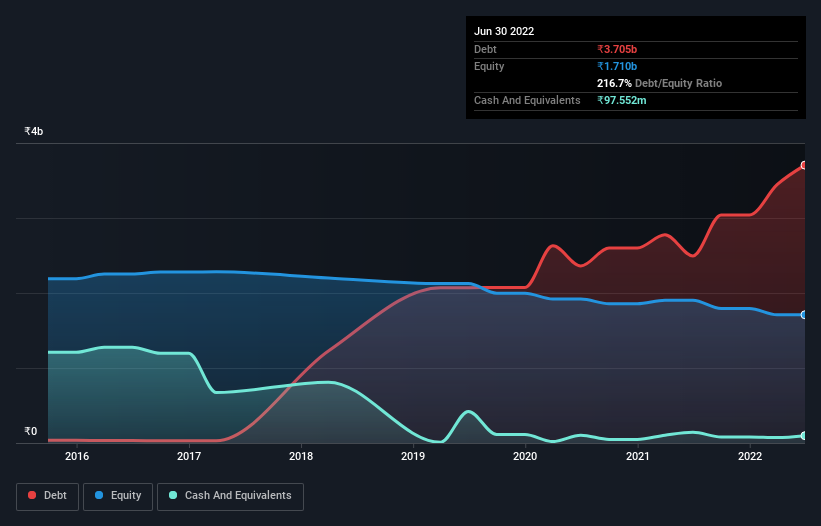- India
- /
- Real Estate
- /
- NSEI:PODDARHOUS
Is Poddar Housing and Development (NSE:PODDARHOUS) Using Debt In A Risky Way?

Some say volatility, rather than debt, is the best way to think about risk as an investor, but Warren Buffett famously said that 'Volatility is far from synonymous with risk.' So it might be obvious that you need to consider debt, when you think about how risky any given stock is, because too much debt can sink a company. As with many other companies Poddar Housing and Development Limited (NSE:PODDARHOUS) makes use of debt. But should shareholders be worried about its use of debt?
When Is Debt Dangerous?
Debt assists a business until the business has trouble paying it off, either with new capital or with free cash flow. Ultimately, if the company can't fulfill its legal obligations to repay debt, shareholders could walk away with nothing. However, a more frequent (but still costly) occurrence is where a company must issue shares at bargain-basement prices, permanently diluting shareholders, just to shore up its balance sheet. Of course, debt can be an important tool in businesses, particularly capital heavy businesses. The first thing to do when considering how much debt a business uses is to look at its cash and debt together.
Check out our latest analysis for Poddar Housing and Development
What Is Poddar Housing and Development's Net Debt?
As you can see below, at the end of March 2022, Poddar Housing and Development had ₹3.70b of debt, up from ₹2.49b a year ago. Click the image for more detail. On the flip side, it has ₹97.6m in cash leading to net debt of about ₹3.61b.

How Strong Is Poddar Housing and Development's Balance Sheet?
We can see from the most recent balance sheet that Poddar Housing and Development had liabilities of ₹2.00b falling due within a year, and liabilities of ₹3.47b due beyond that. Offsetting these obligations, it had cash of ₹97.6m as well as receivables valued at ₹305.4m due within 12 months. So its liabilities outweigh the sum of its cash and (near-term) receivables by ₹5.07b.
The deficiency here weighs heavily on the ₹1.55b company itself, as if a child were struggling under the weight of an enormous back-pack full of books, his sports gear, and a trumpet. So we'd watch its balance sheet closely, without a doubt. After all, Poddar Housing and Development would likely require a major re-capitalisation if it had to pay its creditors today. When analysing debt levels, the balance sheet is the obvious place to start. But it is Poddar Housing and Development's earnings that will influence how the balance sheet holds up in the future. So if you're keen to discover more about its earnings, it might be worth checking out this graph of its long term earnings trend.
Over 12 months, Poddar Housing and Development reported revenue of ₹631m, which is a gain of 5.6%, although it did not report any earnings before interest and tax. That rate of growth is a bit slow for our taste, but it takes all types to make a world.
Caveat Emptor
Importantly, Poddar Housing and Development had an earnings before interest and tax (EBIT) loss over the last year. To be specific the EBIT loss came in at ₹91m. Combining this information with the significant liabilities we already touched on makes us very hesitant about this stock, to say the least. That said, it is possible that the company will turn its fortunes around. Nevertheless, we would not bet on it given that it vaporized ₹425m in cash over the last twelve months, and it doesn't have much by way of liquid assets. So we think this stock is risky, like walking through a dirty dog park with a mask on. When analysing debt levels, the balance sheet is the obvious place to start. However, not all investment risk resides within the balance sheet - far from it. For example, we've discovered 3 warning signs for Poddar Housing and Development (2 are a bit concerning!) that you should be aware of before investing here.
Of course, if you're the type of investor who prefers buying stocks without the burden of debt, then don't hesitate to discover our exclusive list of net cash growth stocks, today.
New: Manage All Your Stock Portfolios in One Place
We've created the ultimate portfolio companion for stock investors, and it's free.
• Connect an unlimited number of Portfolios and see your total in one currency
• Be alerted to new Warning Signs or Risks via email or mobile
• Track the Fair Value of your stocks
Have feedback on this article? Concerned about the content? Get in touch with us directly. Alternatively, email editorial-team (at) simplywallst.com.
This article by Simply Wall St is general in nature. We provide commentary based on historical data and analyst forecasts only using an unbiased methodology and our articles are not intended to be financial advice. It does not constitute a recommendation to buy or sell any stock, and does not take account of your objectives, or your financial situation. We aim to bring you long-term focused analysis driven by fundamental data. Note that our analysis may not factor in the latest price-sensitive company announcements or qualitative material. Simply Wall St has no position in any stocks mentioned.
About NSEI:PODDARHOUS
Poddar Housing and Development
Engages in real estate construction, development, sale, and other related activities in India.
Good value very low.
Market Insights
Community Narratives



